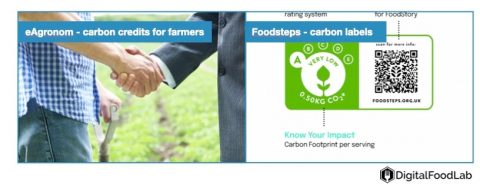It’s not every day that a former tech glory tries to redeem themself through a new venture. In a time of decreased investments in tech, it is even rarer when two of them announce significant deals in the same domain. Indeed, this week, we learned that:
- Flowcarbon, the new startup led by Adam Neumann (the infamous co-founder of WeWork) that tokenizes carbon credits on the blockchain, raised $70M.
- Planet FWD, the startup founded by Julia Collins (the co-founder of Zume, the former unicorn pizza robot startup now turned into packaging), raised $10M for its carbon-assessment platform dedicated to consumer brands.
This is beyond a mere coincidence. We have observed a surge of deals in the growing space around carbon credits and “carbon awareness”. All these projects have a deep implication on all the food value chain, from farmers (who can be the suppliers of carbon credits) to consumers (who make more and more choices based on the provenance and the environmental impact of their foods). We can divide it into at least two broad categories:
1 – startups managing carbon credits (on blockchains)
We have observed a recent surge in the number of carbon credit marketplaces, most of which store the information on a blockchain. Indeed, today the process is quite complicated and involves a lot of paperwork. Many of them have recently raised money:
- Flowcarbon that we mentioned above (but which is not specifically agriculture-oriented)
- eAgronom, an Estonian startup that raised €6.4M in February, specialising in carbon credits that are pre-paid to farmers.
- Nori ($7M raised in February) focuses on carbon removal through regenerative agriculture. It builds an Ethereum-based reward system to incentivize farmers to use such techniques.
The ecosystem is still made of early-stage startups, but the growth potential is huge. Many entrepreneurs and investors are betting on the rise of carbon prices. Building tools to help farmers get their carbon credits pre-paid and incentivize them to use carbon removal techniques without too much red tape could become a huge business.

2 – startups developing carbon labels
Second, are platforms that are developing carbon labels for the food industry. Indeed, it is highly complicated for a food company to know precisely the impact of the products it sells, from packaging to shipping. Again, we see a strong appetite with:
- Planet FWD mentioned above
- Foodsteps, a UK-based startup, which also raised €3.8M this week
- Klimato, a Swedish startup that develops carbon labels for the foodservice industry
Helping brands compare themselves to their competitors and acquire an awareness of the carbon impact of each of their products is indeed a highly interesting business. However, we can wonder if the multiplication of “scores” will be truly helpful for the consumer.
This space is highly exciting, as shown by these multiple deals (made in difficult times for the overall tech ecosystem). And everyone deserves a second chance, even if it implies rebranding oneself as the saviour of the environment.







